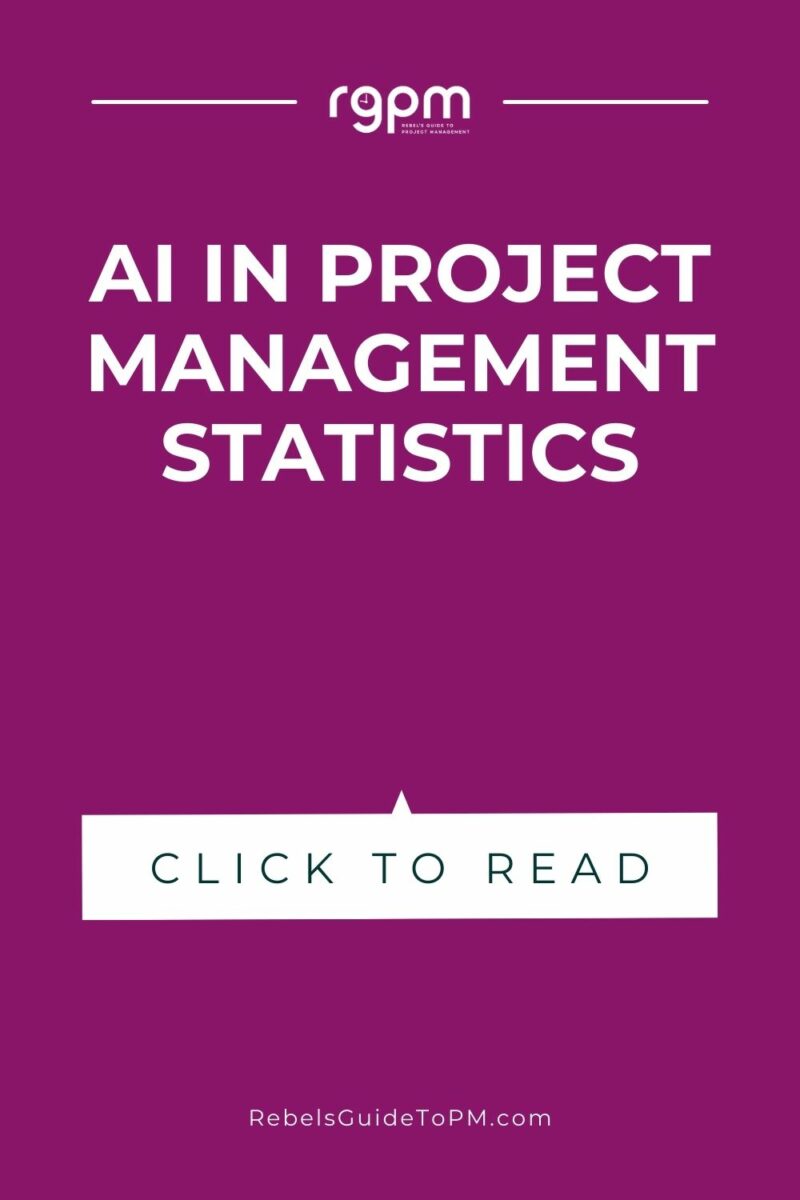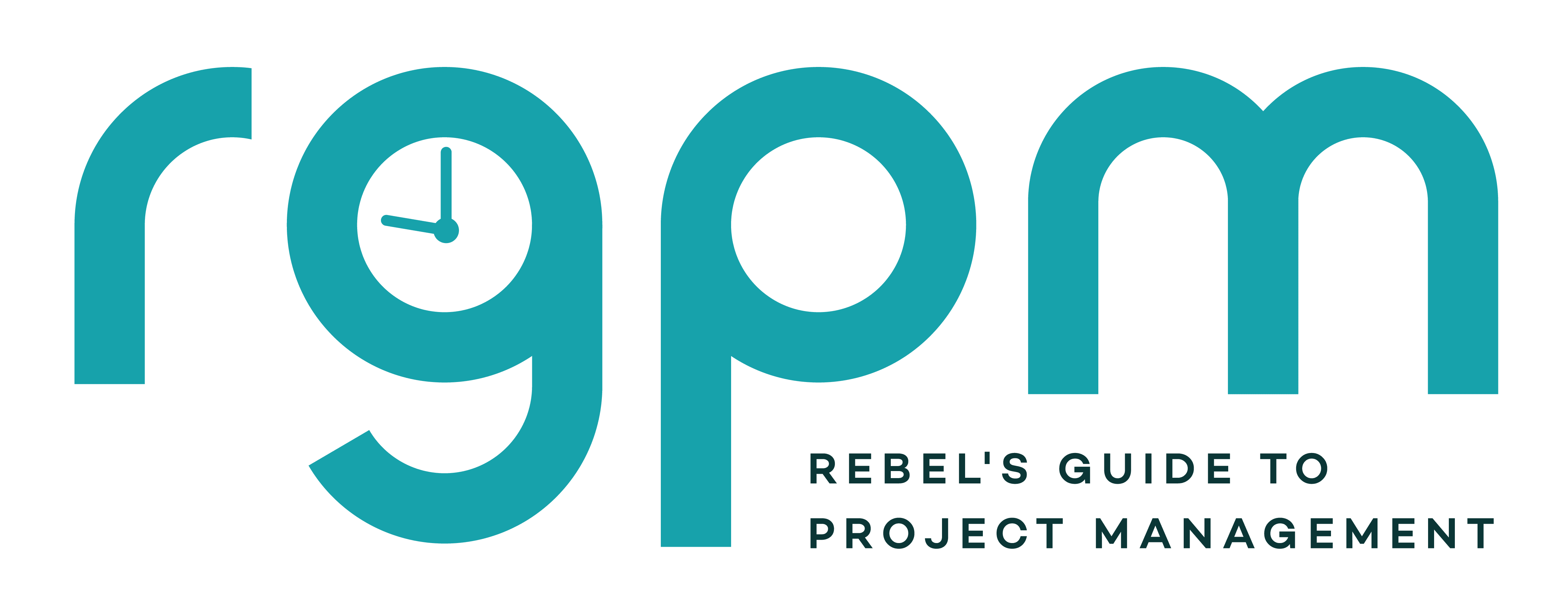57 AI in Project Management Statistics
We gathered 57 of the top AI in project management statistics to help understand this key development in technology. Recent advancements in tech have changed how project managers work in 2024.
Using our 20 years of project management experience, we reviewed AI statistics and trends from trusted third parties, which forms the foundation for this list. It covers everything from the impact of AI replacing jobs to how AI is used to support the delivery of projects.
Many project managers will be aware of the impact (or potential impact) of GenAI and other AI technologies in project management, although not everyone has yet to see substantive benefits in real-life adoption. Let’s take a look at the latest stats.
Top AI in project management statistics
You’ve probably read that 80% of project management tasks will be eliminated by AI by 2030 (Gartner). That means removing the busywork of project management like data collection, status reporting and tracking – which I think is a good thing.
Here are some other top project management statistics worth knowing.
- The global market for AI for project management is expected to grow to US$5.7bn by 2028 at a CAGR of 17.3%.
- 41% of experts report significant enhancements in project delivery since adopting AI-based tools and techniques.
- 28% of a project manager’s skill set can be augmented by GenAI including methodology and life-cycle driven tasks.
- There are more data and analytics projects being kicked off in 2024 than previous years, with 77.6% of organizations reporting that they are driving business innovation with data compared to 59.5% in 2023.
- 72% of project managers say AI is very or extremely likely to change their roles.
Sources: Markets and Markets, Nieto-Rodriguez/Viana Vargas, LinkedIn, Wavestone, APM
Listen to me and Cornelius Fichtner discussing these stats in a webinar
I met Cornelius for a webinar on AI for project managers and what these statistics really mean for practitioners. We got some great questions during the live broadcast, so if you’d rather watch than read, check it out!
Join Cornelius Fichtner, the founder of the PM PrepCast, as he brings you a comprehensive course on learning the AI skills in demand with today's project managers. Learn at your own pace through concise video lessons. This course is eligible for 14.75 PDUs.
Adoption of AI in project management
22% of project managers say AI tools are deployed in their organizations and in use today (Capterra). However, different surveys report different adoption levels. PMI’s GenAI report says that a third of practitioners’ organizations have adopted AI in at least a moderate capacity.
Only 12% have adopted AI in a substantial way, and the adoption levels are much higher in tech-forward companies (34%).
- 39% of project managers say there are plans to deploy AI tools in their organizations.
- 21% of business leaders say deployment of AI tools is not in their current plans.
- Companies expect to increase investment in AI for their project management function by 32%.
- 29% of project professionals say they don’t feel ready for the adoption of AI tools. Only 9% say they are extremely ready.
- 75% of experts say complex projects are very likely or extremely likely to benefit from AI compared to a simple project.
Sources: Capterra, IPMA, PMI, APM

Impact of AI on project management jobs
47% of people believe that AI would do better at treating all job applicants in the same way than humans (Pew Research). So that could be a positive for project managers applying for jobs.
Will AI replace project managers? I don’t think human intelligence will ever be removed from project delivery. Here are some other statistics on the impact of AI on project management roles.
- 85% of people believe that on-the-job training is the best way to develop the AI skills required.
- Large Language Models help the least experienced employees the most. Research shows that less experienced staff showed a 43% improvement in performance when using LLMs, compared to an improvement of only 17% by more experienced staff.
- 80% of project leaders believe they will have more time for complex managerial tasks when using AI tools.
- The non-IT skill required the most for using AI in project management is analytical thinking, followed by creative thinking and complex problem solving. Social skills are considered the least likely to be needed to use AI.
- Only 40% of practitioners believe that AI will create new tasks. 54% believe it will change the way work is organized and 53% believe it will increase project team agility.
- 65% of experts see AI as a catalyst for implementing advanced project management strategies.
Sources: IPMA, Microsoft, Nieto-Rodriguez/Viana Vargas, APM
AI Project Manager salaries
I couldn’t find a survey that summarized AI project manager jobs and salaries, probably because there aren’t that many positions. The role hasn’t been around that long. Oceania is the continent that is doing the most to build or recruit AI competence into the organization (PMI).
However, I searched Glassdoor and Totaljobs, and from the job adverts I saw, the average salary for an AI project manager in London, UK, was £75,000.
Glassdoor puts salaries for an AI project leader at between £41k and £77k per year.
Salary.com says that Wells Fargo pays AI project managers between $90,629 and $124,401.
Another way to review the salaries for an AI project manager is to consider that as it’s a niche skill, those roles are likely to command higher-than-average salaries. The Bureau of Labour Statistics says the highest 10% of project management specialists earned $159,150, so you could consider that a benchmark.
One thing that isn’t clear is whether AI will, over time, actually reduce salaries as the role will not require so much administrative work – companies might be looking to make cost savings.
Uses of AI in project management
AI is in use by project delivery practitioners and Project Management Office professionals, generally through tools like ChatGPT or Microsoft Copilot, and more specifically such as in tools designed to support particular domains like AI in risk management.
Latin America has the highest AI maturity levels and also spends the most effort on making sure employees are ready to use AI tools (PMI).
25% of PMO directors say that AI has disrupted their PMO (Capgemini) – and I’m sure that number will only continue to rise. Let’s look at some more statistics about the benefits of AI.
- Over 70% of practitioners say that achieving compliance with quality standards could benefit from AI adoption.
- 65% of project managers say that they are most likely to use AI during project deployment and execution phases.
- Automating tasks is the top benefit for using AI tools (cited by 33% of project professionals), followed by effective resource allocations (32%) and getting more accurate metrics (27%).
- Predictive analytics tools and chatbots are the most commonly used, with 26% of organizations using these or planning to use these to support project delivery.
- 23% of organizations are using or planning to use RPA.
- 66% of experts believe that project scheduling and time management is the area with the highest potential for AI process automation.
- 60% believe that augmented analytics can help risk and opportunity planning and management.
- 49% of organizations believe that implementing GenAI will generate huge productivity gains.
- Over a quarter of project managers are extremely likely to use AI to analyze large data sets on complex projects – I can see this being useful for identifying potential risks and in analyzing real-time data.
Interestingly, project management domains where there is low impact from AI are considered to be stakeholder management, project communication and project budgeting.
Sources: Capterra, APM, IPMA, Wavestone, PMI
Barriers to adopting AI in project delivery
The ‘classic’ barriers to adopting any new technology, like limited funding, user adoption and senior support, training etc are holding back AI’s progression into companies.
But other limitations like the carbon offsetting burden – training an LLM can emit 25 times more carbon than one-way air travel between New York and San Francisco – may also hold companies back from building their own solutions (Stanford).
- 70% of people report that a limited understanding of AI technologies is the most important barrier to using new tools.
- 49% of professionals say that limited financial resources are a barrier to adopting AI.
- 28% of project professionals say lack of a clear strategy is the main barrier to adopting AI tools at work.
- Other barriers to adopting AI include ethical, privacy and security concerns (26%), and AI technology immaturity (25%)
- 1 in 5 project managers say there are inadequate skills within the team to implement AI tools.
- 74% of experts are worried about potential ethical challenges resulting from AI-based decision making.
Sources: IPMA, Capterra, Nieto-Rodriguez/Viana Vargas
How project managers feel about AI
The future of project management is positive, with high demand for jobs and a strong focus on successful project outcomes – there is a lot to be done, and AI is poised to help.
- 44% of project practitioners believe that they will end up with more projects to manage as a result of organizations adopting AI.
- Only 29% of project managers are worried about AI taking over their jobs, although this increases to 40% in the next 15 years.
- 77% of project managers are optimistic about AI.
- 44% of project professionals say they are extremely satisfied with the use of AI technology at work, and 46% report being very satisfied.
- 54% of companies using AI in project management are very comfortable using it to make decisions. Only 2% are not comfortable.
- 68% of project managers say they have not received enough training on how to use AI tools.
Sources: IPMA, Nieto-Rodriguez/Viana Vargas, Capterra, APM

What do these project management and AI statistics mean?
Here are my top 3 takeaways from analyzing hundreds of artificial intelligence project management statistics, charts and numbers.
Takeaway 1: AI isn’t going to take your job
My key takeaway from analyzing the data is that AI isn’t going to take your job if you work in project delivery. Too many project management skills can’t be done by computers… which is a good thing in my view! You can only get so much business acumen, systems thinking and cultural understanding from a model.
However, the many surveys and research studies all point to the same thing: the role of a project manager is changing, so you do need to keep up to date with how the tech is evolving.
Consider how AI can help with monitoring, controlling and creating project deliverables. The other area to actively look into is resource management: resource availability and capacity planning is a common pain point with the project managers I mentor, so anything that helps is a plus.
I think there is a lot of data and training out there now, including courses from LinkedIn Learning and PMI, so there is no excuse not to have a basic understanding of tools like GenAI and what they can do.
If you can lobby for AI training and time to practice with the tools available for you, then do so. Knowing how AI-driven solutions work will only make your job easier, and most project managers report not having been provided with adequate training.
Takeaway 2: AI benefits complex projects
The next thing that was clear to me from reviewing the data is that AI benefits complex projects. The larger your data sets for research and analysis, the more AI-powered tech can make it easy for you to sift through the data.
APM’s research says that IT and Technology projects are most likely to see a benefit from AI but I think over time we’ll also see legal project management and construction seeing benefits due to the huge amounts of data that can be used in those projects.
I think that the biggest barrier to making use of this advancement is having clean data. I would suggest that any project teams looking to use the analytical power of data models and LLMs need to schedule time on the plan for data cleansing and preparation.
Takeaway 3: GenAI benefits less experienced project professionals
Finally, I picked out the point that GenAI is more beneficial to people with less experience. Project success rates are hugely impacted by the quality of the team working on the project. With natural language processing and machine learning, it is easier to review data from historical projects to support project planning.
This is so important for a profession where we are losing experienced project managers to burnout and people transitioning out of the job. Routine tasks can be made easier and projects processes can be turned into workflows with RPA.
Final thoughts
Reliable AI facts and statistics on artificial intelligence in project management is important to understand the sentiment of how project professionals are feeling about the impact of newer technologies and to provide valuable insights into how it is used.
AI will continue to dominate project delivery conversations and become embedded in the ways that projects are scoped, executed and analyzed in the years to come, most likely removing administrative tasks and supporting informed decisions.
Perhaps the question we should be asking is how do we want AI to impact project management? Then we can shape the technology to deliver the best results.

